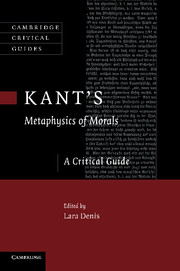Book contents
- Frontmatter
- Contents
- Notes on contributors
- Acknowledgements
- List of translations and abbreviations
- Introduction
- 1 Kant's Metaphysics of Morals: the history and significance of its deferral
- 2 Reason, desire, and the will
- 3 Justice without virtue
- 4 Kant's innate right as a rational criterion for human rights
- 5 Intelligible possession of objects of choice
- 6 Punishment, retribution, and the coercive enforcement of right
- 7 Moral feelings in the Metaphysics of Morals
- 8 What is the enemy of virtue?
- 9 Freedom, primacy, and perfect duties to oneself
- 10 Duties to and regarding others
- 11 Duties regarding animals
- 12 Kant's Tugendlehre as normative ethics
- Bibliography
- Index
12 - Kant's Tugendlehre as normative ethics
Published online by Cambridge University Press: 10 January 2011
- Frontmatter
- Contents
- Notes on contributors
- Acknowledgements
- List of translations and abbreviations
- Introduction
- 1 Kant's Metaphysics of Morals: the history and significance of its deferral
- 2 Reason, desire, and the will
- 3 Justice without virtue
- 4 Kant's innate right as a rational criterion for human rights
- 5 Intelligible possession of objects of choice
- 6 Punishment, retribution, and the coercive enforcement of right
- 7 Moral feelings in the Metaphysics of Morals
- 8 What is the enemy of virtue?
- 9 Freedom, primacy, and perfect duties to oneself
- 10 Duties to and regarding others
- 11 Duties regarding animals
- 12 Kant's Tugendlehre as normative ethics
- Bibliography
- Index
Summary
INTRODUCTION
In The Metaphysics of Morals, especially the Tugendlehre or Doctrine of Virtue, Kant clarifies, develops, and extends ideas that he presented in the Groundwork for the Metaphysics of Morals and the Critique of Practical Reason. These earlier works attempt to articulate and defend the fundamental moral law, and they argue that all previous moral theories fail to appreciate the autonomy of will that we must attribute to ourselves as rational moral agents. They provide only a few brief examples of how this supreme principle can guide moral deliberation, a task that the Groundwork explicitly postpones for a later “metaphysics of morals” (G 4:391). Kant published a two-part work of this title late in his life (1797–98), and it is here that we find his fullest official presentation of his normative ethical theory (or here “normative ethics”).
My plan is to review and highlight certain features of Kant's normative ethics as I understand it. My focus will be primarily on general features, especially its aim and structure, rather than on specific first-order duties. The discussion will be wide-ranging, though not comprehensive. The interpretations that I propose may be controversial at points, but I shall not defend them here. My hope is that together they present the Tugendlehre as a normative ethics that is coherent and contrasts with other normative ethical theories in interesting ways.
- Type
- Chapter
- Information
- Kant's Metaphysics of MoralsA Critical Guide, pp. 234 - 255Publisher: Cambridge University PressPrint publication year: 2010
- 1
- Cited by

